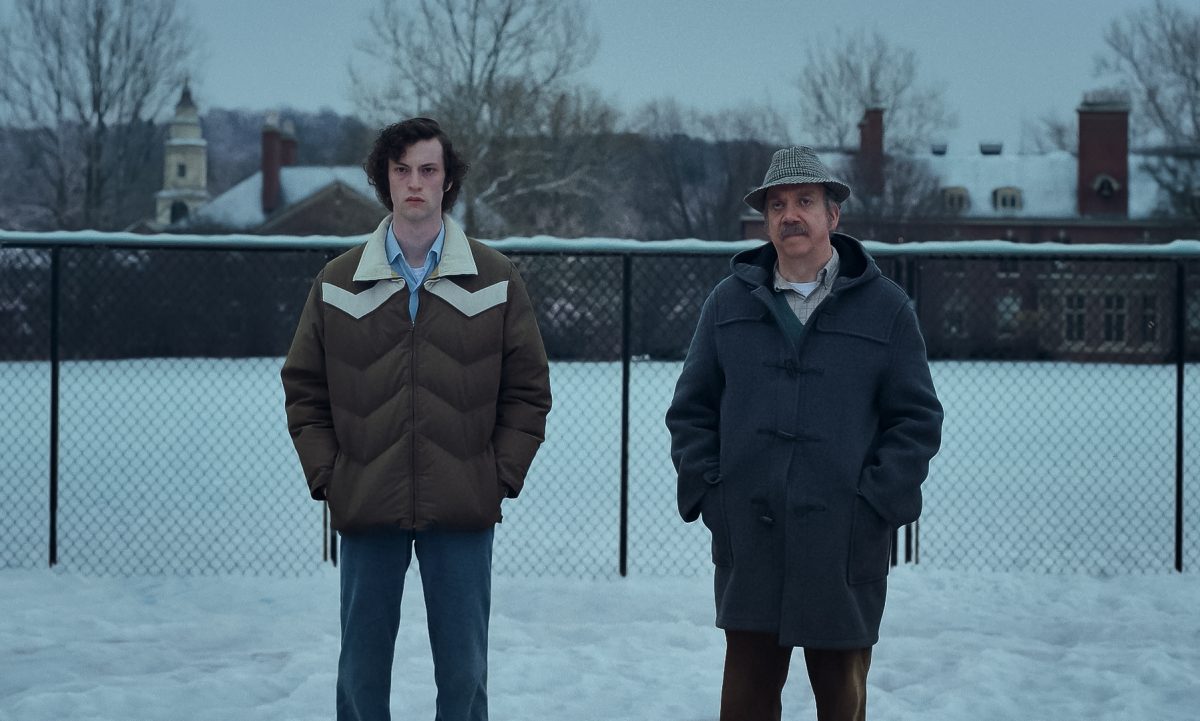Despite its understated appearance, the exploration of grief, comforting comedy and nostalgic ambiance in “The Holdovers” packs the emotional and cinematic punch that moviegoers have longed for since before the pandemic.
“The Holdovers” is director Alexander Payne’s first film since his 2017 flop, “Downsizing.” David Hemingson, who has never received credit on a project of this magnitude, wrote the screenplay. The film netted him his first set of major award nominations, including a Best Original Screenplay nod from the Academy Awards. The film follows an incredibly small cast of Paul Giamatti, Da’Vine Joy Randolph and Carnegie Mellon student Dominic Sessa in his film debut.
Giamatti plays the strict and jaded classics teacher at the elite Barton Academy stuck with the job of babysitting the troubled and angsty student Angus Tully, played by Sessa. Joining them is Mary Lamb, a grief-stricken lunch lady. They make up Barton’s “holdovers ”— those who remain at the New England boarding school during Christmas break.
The story is sparse in a way that works very well. In its somberness, you get to explore these three characters in a way jet-setting all over the place plot-wise would not allow. Hemingson’s script is exceedingly smart. Although some of the comedy falls flat for me, his character work is something to marvel at.
The characters reveal so much about themselves in such subtle and surprising ways. The relationships between the characters and how they develop are paced beautifully. By the film’s end, you wish to spend more time with these people. The entire story is utterly sad, but it never leaves the audience feeling drained. Each character is grieving something, whether it’s a person or an idea of what life could be, and they all display this in different ways that feel relatable, no matter what you are going through. It’s melancholic, yet hopeful.
This tiny ensemble absorbs most of the film’s screen time. For a film with such a character-driven plot, other actors may struggle to hold the audience’s attention, but these three bounced off each other incredibly. They make an unlikely trio, but their relationship feels so real. Paul Giamatti offers a career-best performance as Paul Hunham. It requires teetering a delicate line to portray a man who seems to be angry at the world simply for the sake of being so without forcing the audience to write off the character completely, but Giamatti not only makes us understand Mr. Hunham — he makes us like him.
In his first feature-length film, Sessa holds his own against two Hollywood regulars. His performance is utterly raw and heartbreaking, yet light and humorous when the script calls for it. Balancing the emotional aspects of this film with the comedy laced throughout is not easy, but Giamatti and Sessa did this well in their individual scenes, and even better together.
However, above all, Randolph’s performance deserves all of the accolades it has received so far. Mary, having just lost her son in the Vietnam War, is dealing with her own grief along with the issues of the men around her. Each line Randolph delivers is so moving and makes Mary feel so real.
While all of these pieces work together to create a beautiful film, Payne’s direction is the true standout. Set at the tail end of 1970, Payne truly captures the aesthetics of the era. Handheld camera work, static shots and expert color grading make the film feel authentic in a way that other period pieces do not. Grainy and grounded, the subtle direction makes you nostalgic for an era you never lived in. Each shot is intimately crafted to reveal exactly what Payne wants us to know about our characters, even when they are trying to shield themselves from others.
For months, I could not enter a movie theater without seeing the trailer for “The Holdovers.” Two states, five months and every film genre under the sun — no matter what, a 2000s-era narrator, silly freeze frames, and “The Holdovers” would roll across my screen in big red font. It sticks out like a sore thumb among the mob of forgettable action movies, big-budget blockbusters and independent dramas. Despite initially dismissing it, the film’s multiple award nominations forced me to acknowledge what I was missing out on.
As we approach the fourth anniversary of the day felt around the world, March 13, 2020, I’ve been looking for a sign that film has returned to its pre-pandemic glory. For years, it’s felt as if studios are constantly waiting for the other shoe to drop. Amid a landscape where everything is made for award buzz, money or streaming, “The Holdovers” — quietly breathtaking and emotionally riveting — is the type of film that renews your belief in the medium or makes you want to scream, “We’re so back,” from rooftops.



